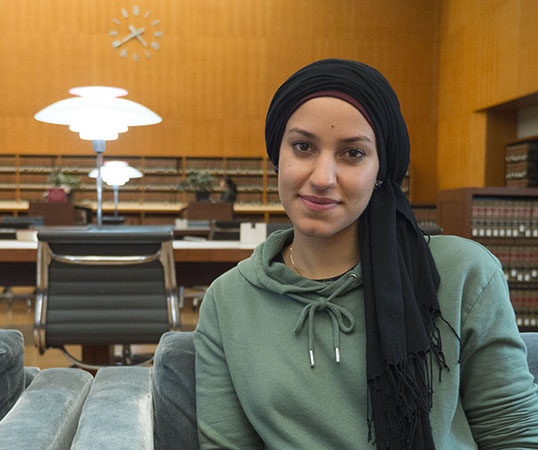 Hometown: Ontario, Canada
Hometown: Ontario, Canada
Education: University of Waterloo 2015
Affiliations: Editor-in-Chief of the Berkeley Middle East and Islamic Law Journal; Equity and Inclusion Chair, Coalition for Diversity; Prisoner Advocacy Network
[Editor’s note: Zainab is the recipient of the 2018 Miller Institute-American Society of International Law (ASIL) Student Fellowship and the Reed Smith Diversity Fellowship]
I was one of the co-founders of an organization called Muslim Social Services. The area where I lived in Ontario was one of the main resettlement sites for refugees. With that comes the need for a whole slew of services to help them live healthy, successful lives. So we did a lot of work relating to spiritually and culturally sensitive counseling and education. You have to meet people where they’re at, and accommodate them in their language and not just expect them to immediately assimilate. That experience taught me a lot about communicating and prioritizing the people who we purport to serve, and it definitely impacts how I think about the role of a lawyer.
My efforts with the Coalition for Diversity are focused on affirming people in the spaces in which they exist and making sure marginalized students are able to have a positive and enriching experience here. I fundamentally believe that our solution spaces are enriched by diversity. If everyone is not meaningfully at the table—not just nominally in a token capacity—you are not going to reach the best outcome.
It’s a constant struggle, even here in Berkeley. But I’ve never been so inspired as I am by my peers here. I’ve made so many strong friendships based on shared goals and values. I love how rich the diversity of experiences are among the people who come to Berkeley Law. We could do better on racial diversity, that’s no secret. But the communities I am part of are so dedicated to improving the institution, so that’s really exciting and positive work.
Universities are almost like small scale worlds in-and-of themselves. It’s a good dry run for thinking about changemaking on a bigger scale when we leave this institution. In learning how to deal with the challenges we face here and collaborating with the administration and community as a whole will help us all be better advocates in our professional lives.